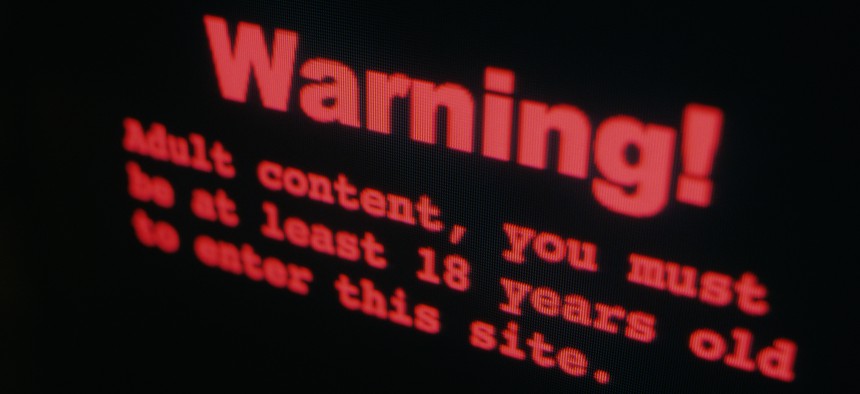States want to see some digital ID before you visit that porn site

Don Farrall/Getty Images
Louisiana requires age verification software to prevent minors viewing adult content. Even as the law has inspired copycat legislation, critics are raising privacy and free speech concerns.
Internet users in Louisiana wishing to view adult content are required by law to verify their age before proceeding, and a spate of other states are looking to follow suit.
Video posted on Twitter and confirmed by other outlets appeared to show an internet user in the state being redirected from Pornhub to age verification service AllpassTrust. The company partners with LA Wallet—the state’s digital identification system based on license data from the state's Office of Motor Vehicles—to ensure users are over 18. Once that is verified successfully, users can then continue browsing.
Louisiana’s law came into effect in January and has inspired other states to propose similar legislation. The Free Speech Coalition, the trade association for the adult entertainment industry, said around 20 states have age verification bills that are at various stages of progress. Some appear to be copies of the Louisiana legislation, while others are not.
Copycat bills have been passed out of the Mississippi, Virginia and Utah legislatures, according to the Free Speech Coalition, and await their governors’ signature or veto. A national bill is also pending in the U.S. Senate.
While supporters of the bills say they are necessary to protect children from the dangers of online pornography, opponents said the legislation could undermine individual privacy and will not prevent minors from viewing adult content. They also said laws requiring age verification for adult content are unconstitutional and could have a chilling effect on the industry and people’s enjoyment of it.
Mike Stabile, director of public affairs at the Free Speech Coalition, said such laws are “at once ineffective and have tremendous downside.”
Similar laws on age verification for access to certain online content have been attempted in the past. It started in the late 1990s with the idea that officials should be able to screen out sections of the internet deemed unsuitable for minors, under sections of the Communications Decency Act. The effort was denied by the Supreme Court in 1997, which found that voluntary content filters for devices are sufficient, avoid an unreasonable burden for users and protect free speech on the internet.
In the years since, some states have attempted to require device manufacturers to pre-install content filters and have users pay a fee to remove them, with that fee then donated to charity.
Stabile said activity picked back up after the passage of the Texas Heartbeat Act last year, which not only restricts abortions in the state but also authorizes members of the public to sue anyone who performs or facilitates an illegal abortion. He argued that law’s passage, the survival of legal challenges and the Supreme Court’s overturning of Roe vs. Wade is inspiring others to use a “similar mechanism” to “get around the First Amendment concerns regarding adult content” and restrict porn.
Under the Louisiana statute, those who publish or distribute material deemed “harmful to minors” could be liable to pay damages.
But for those who oppose the legislation that mandates age verification to view adult content, the primary issue is protecting people’s personal data.
An AllpassTrust spokesperson referred to the company’s privacy policy when asked if, and where, it stores any user data on those in Louisiana who use its service. In that privacy policy, AllpassTrust said it stores users’ personal data “for different periods of time depending upon the purposes for which we collected it and we do not store your personal data for longer than is necessary to fulfill these purposes.”
The company said it also considers a “number of factors” when determining how long to store data. The AllpassTrust spokesperson declined to comment further. The Louisiana bill says age verifiers “shall not retain any identifying information of the individual after access has been granted to the material.”
But while there is the requirement that age verification companies may not store personal data, Stabile said just the transmission of that personal data online could be a “honeypot for hackers” if they can break into verification company systems, make copies of any personal data they see and then sell it or extort people for money under the threat of revealing their viewing habits. The Federal Trade Commission has identified that form of blackmail as a common extortion tactic.
Instead of these bills, the Free Speech Coalition called for a consistent standard of age verification that is neither vulnerable to hacking nor overly burdensome to customers. Meanwhile, those in favor of restrictions like that in Louisiana reject any claims about the technology not being mature enough or subject to hacking.
In a January statement after that state’s legislation went into effect, Eleanor Gaetan, vice president and director of public policy for the National Center on Sexual Exploitation, said the Louisiana law “recommends digital identity technology that the state has already established.” She also called the verification process “easy, accessible, and very private,” and said it is not burdensome for businesses.
Another issue may be the sheer amount of pornographic content available online, not just on adult entertainment websites but across mainstream social media platforms. Stabile said these bills will not stop minors accessing adult content, especially as they can use a virtual private network to get around state-level efforts to stop them. “It's like you've got a liquor store that takes ID, but there's another one next door that doesn’t,” he said. “It’s almost an honor system.”






